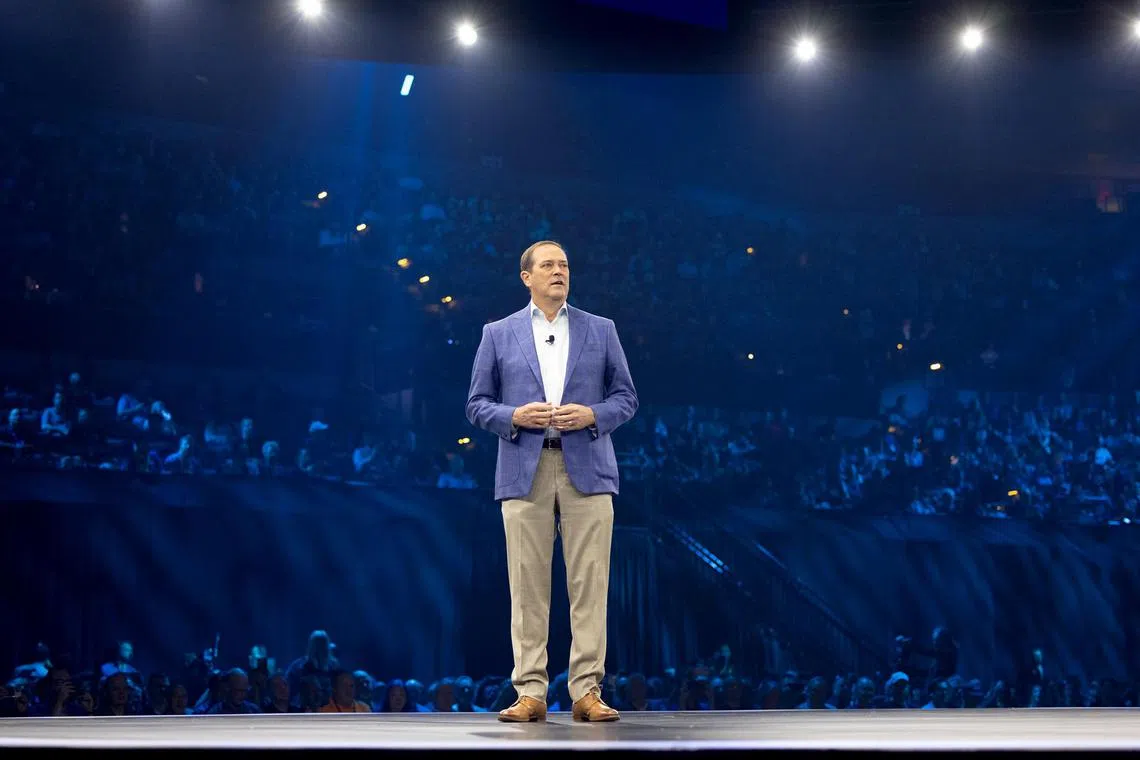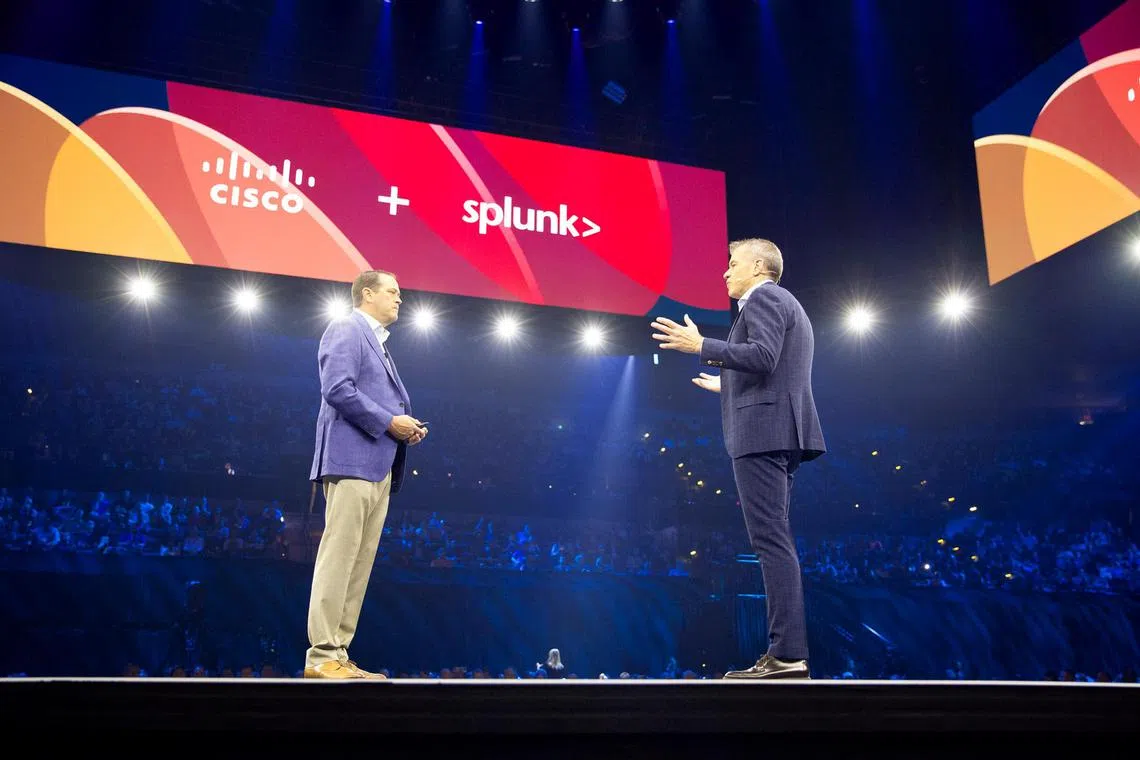US tech firm Cisco bets $1.35 billion on AI start-ups; Singapore firms may apply
Sign up now: Get ST's newsletters delivered to your inbox

Cisco's chief executive Chuck Robbins described innovation as a top priority in his keynote address at the Michelob Ultra Arena.
PHOTO: CISCO
Follow topic:
LAS VEGAS - Technology firm Cisco is spending US$1 billion (S$1.35 billion) on start-ups that could enhance its artificial intelligence (AI) network and security solutions, joining the billion-dollar club of tech giants leveraging their cash piles to get ahead in the AI race.
About US$200 million of the fund has been committed, some of it on language-model makers Cohere and Mistral AI, and AI app platform Scale AI.
Addressing over 20,000 delegates at the annual Cisco Live conference on June 5, Cisco’s chief executive Chuck Robbins said the firm missed out on the rise of cloud technology and in recent years, faced calls to innovate faster.
“When the cloud era hit, we perhaps weren’t as prepared as we should have been,” he said. “I will tell you today: As this AI era begins, we are very, very prepared.”
This time, the company will seek out prospects that can co-develop innovative products.
He said: “We’re thinking about this billion AI fund a little differently, because everybody yawns when you hear about a billion dollars in AI these days. Oh, another billion dollars.”
The San Jose-based firm is not ruling out pitches from Singapore, said Mr Derek Idemoto, Cisco’s senior vice-president for corporate development.
Two members of his team that assesses the thousands of pitches Cisco gets are based in the Republic.
Despite a venture funding drought, research firm PitchBook estimates that generative AI start-ups raised about US$27 billion from investors in 2023. Amazon, Microsoft and Google shelled out about two-thirds of that sum, or US$18 billion.
Having a foot in the right AI start-up could mean dominance in the new AI world, as shown by Microsoft’s reported US$13 billion investment in OpenAI, the maker of ChatGPT.
Cisco, which registered a record US$57 billion in revenues in 2023, has made over 20 AI-related acquisitions and investments to date.

Cisco’s chief executive Chuck Robbins (left) in his keynote at the Michelob Ultra Arena with Splunk’s former chief executive Gary Steele, who is now Cisco’s go-to-markets president.
PHOTO: CISCO
After its latest US$28 billion takeover of data platform Splunk in March, Cisco has been rapidly digesting Splunk’s customer base of 15,000.
It has begun integrating Splunk’s edge in observability – the ability to infer issues inside systems from external outputs – into its own capabilities.
At the conference, the firm launched more than 15 new features across its core product areas of network infrastructure, security solutions, support services, internet connectivity hardware and office collaboration tools.
It also announced a partnership with Microsoft to exchange security intelligence, an enhanced security tie-up with Google’s Chrome Enterprise, and worked with Nvidia on a data centre solution that required no deep technical background.
Data will be Cisco’s new differentiating focus in the AI world, Mr Robbins said.
It will mark a new era for the firm founded in 1984 by two computer scientists from Stanford University, which originally sold equipment like switches and routers.
Mr Zeus Kerravala, the founder and analyst at ZK Research, said: “Today was the first time I have actually ever seen a Cisco AI strategy.”
Cisco has tried for years to integrate security into the networking infrastructure it builds for clients, but never got far, he said.
With AI, it could be different this time.
“Security is a massive market which is highly fragmented with no real market leader. So there’s an opportunity there for Cisco to really establish itself as a security vendor.” AI will simplify the deployment of Cisco’s solutions, which has grown in complexity, he added.
“There’s a bit of a trust hurdle to get over. Once that is over, the AI capabilities make automation easier, which makes the Cisco technology easier to consume.”
He wants to see more of that strategy, Mr Kerravala said.
He added: “It’s a little bit like if you’re in a Tesla and the Tesla sees a kid running down the street. You want the car just to stop. You don’t want it to tell the driver, ‘Hey, this kid in the street, I think you should stop.’ By that time, it’s too late.”
Customers at the conference said Cisco’s solutions such as ThousandEyes and Meraki have helped them spot and fix network glitches more quickly, with more transparency.
Mr Ralph Riley, director of broadcast IT at the WWE – the World Wrestling Entertainment – pointed to an outage alert incident by ThousandEyes, which took the guesswork out of troubleshooting.
“We were able to take that snapshot and send our ISP (internet service provider) that link. And of course, the lightbulb went off at that point, and they said yes, we do see an issue,” he said.
Senior network engineer Mark Rodrigue of furniture retailer Room & Board said he is thinking about equipping colleagues with tools that they could use to fix technical issues themselves, or let them ask the right questions before they seek help.
“That’s something we’re actually going to be challenging our Cisco partners next year,” he said.
Cisco, which has more than 80,000 employees worldwide, also announced new AI training programmes for customers and a certification in designing modern AI architecture for workers.


